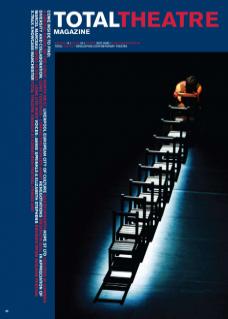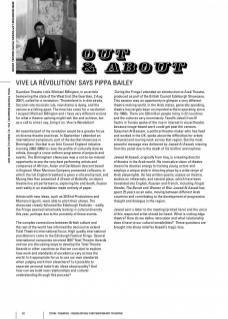Guardian Theatre critic Michael Billington, in an article bemoaning the state of the West End (the Guardian, 2 Aug 2007), called for a revolution: ‘Theatreland is in dire straits. Second-rate musicals rule, new drama is dying, and the venues are falling apart. The time has come for a revolution’. I suspect Michael Billington and I have very different visions for what a theatre uprising might look like and achieve, but as a call to arms I say, bring it on. Vive la Révolution!
An essential part of my revolution would be a greater focus on diverse theatre practices. In September I attended an international symposium, part of the decibel showcase in Birmingham. Decibel is an Arts Council England initiative (running 2003-2008) to raise the profile of culturally diverse artists, through a cross-artform programme of projects and events. The Birmingham showcase was a not-to-be-missed opportunity to see the very best performing artists and companies of African, Asian and Caribbean descent based in England. Mem Morrison Company presented Leftovers, in which the full English breakfast is given a citizenship test, and Myung Hee Han presented A Dream of Butterfly, an object theatre live art performance, exploring life and death, illusion and reality in an installation made entirely of paper.
Artists with new ideas, such as 30 Bird Productions and Mamoru Iriguchi, were able to pitch their shows. The showcase closely followed the Edinburgh Festivals – sadly, the Fringe seemed remarkably lacking in cultural diversity this year, perhaps due to the proximity of these events.
The complex connections between British culture and the rest of the world has informed the decision to extend Total Theatre’s international focus. High quality international practitioners come to the Edinburgh Festival Fringe. Several international companies received 2007 Total Theatre Awards and we are discussing ways to develop the Total Theatre Awards in other countries so that we can start to explore how work and standards of excellence vary across the world. Is it appropriate for us to use our own standards when judging work from elsewhere? Is it possible to separate personal taste from ideas about quality? And how can we build new relationships and cultural understanding through this process?
During the Fringe I attended an introduction to Arab Theatre, produced as part of the British Council Edinburgh Showcase. This session was an opportunity to glimpse a very different theatre-making world. In the Arab states, generally speaking, theatre has largely been an imported artform operating since the 1960s. There are 320 million people living in 22 countries and the cultures vary enormously. Taoufik Jebali from El Teatro in Tunisia spoke of the rise in interest in visual theatre because image-based work could get past the censors. Sulayman Al Bassam, a political theatre-maker who has lived and worked in the UK, spoke about the difficulties for artists in Kuwait and touring work across that region. But the most powerful message was delivered by Jawad Al Assadi, missing from the panel due to the death of his brother and nephew.
Jawad Al Assadi, originally from Iraq, is a leading director of theatre in the Arab world. His innovative vision of theatre means he devotes energy to training young actors and employs a unique style in directing plays by a wide range of Arab playwrights. He has written poems, essays on theatre, studies on rehearsals, and several plays, which have been translated into English, Russian and French, including Forget Hamlet, The Bench and Women of War. Jawad Al Assadi has spent 25 years as an exile, moving between different Arab countries and contributing to the development of progressive thought and dialogue in the region.
Jawad sent a letter to the meeting (printed here) and the voice of this respected artist should be heard. What is cutting edge theatre? How do we define innovation and what relationship does it have to our cultural sensibilities? These questions are brought into sharp relief by Assadi’s tragic loss.
Guardian Theatre critic Michael Billington, in an article bemoaning the state of the West End (the Guardian, 2 Aug 2007), called for a revolution: ‘Theatreland is in dire straits. Second-rate musicals rule, new drama is dying, and the venues are falling apart. The time has come for a revolution’. I suspect Michael Billington and I have very different visions for what a theatre uprising might look like and achieve, but as a call to arms I say, bring it on. Vive la Révolution!
An essential part of my revolution would be a greater focus on diverse theatre practices. In September I attended an international symposium, part of the decibel showcase in Birmingham. Decibel is an Arts Council England initiative (running 2003-2008) to raise the profile of culturally diverse artists, through a cross-artform programme of projects and events. The Birmingham showcase was a not-to-be-missed opportunity to see the very best performing artists and companies of African, Asian and Caribbean descent based in England. Mem Morrison Company presented Leftovers, in which the full English breakfast is given a citizenship test, and Myung Hee Han presented A Dream of Butterfly, an object theatre live art performance, exploring life and death, illusion and reality in an installation made entirely of paper.
Artists with new ideas, such as 30 Bird Productions and Mamoru Iriguchi, were able to pitch their shows. The showcase closely followed the Edinburgh Festivals – sadly, the Fringe seemed remarkably lacking in cultural diversity this year, perhaps due to the proximity of these events.
The complex connections between British culture and the rest of the world has informed the decision to extend Total Theatre’s international focus. High quality international practitioners come to the Edinburgh Festival Fringe. Several international companies received 2007 Total Theatre Awards and we are discussing ways to develop the Total Theatre Awards in other countries so that we can start to explore how work and standards of excellence vary across the world. Is it appropriate for us to use our own standards when judging work from elsewhere? Is it possible to separate personal taste from ideas about quality? And how can we build new relationships and cultural understanding through this process?
During the Fringe I attended an introduction to Arab Theatre, produced as part of the British Council Edinburgh Showcase. This session was an opportunity to glimpse a very different theatre-making world. In the Arab states, generally speaking, theatre has largely been an imported artform operating since the 1960s. There are 320 million people living in 22 countries and the cultures vary enormously. Taoufik Jebali from El Teatro in Tunisia spoke of the rise in interest in visual theatre because image-based work could get past the censors. Sulayman Al Bassam, a political theatre-maker who has lived and worked in the UK, spoke about the difficulties for artists in Kuwait and touring work across that region. But the most powerful message was delivered by Jawad Al Assadi, missing from the panel due to the death of his brother and nephew.
Jawad Al Assadi, originally from Iraq, is a leading director of theatre in the Arab world. His innovative vision of theatre means he devotes energy to training young actors and employs a unique style in directing plays by a wide range of Arab playwrights. He has written poems, essays on theatre, studies on rehearsals, and several plays, which have been translated into English, Russian and French, including Forget Hamlet, The Bench and Women of War. Jawad Al Assadi has spent 25 years as an exile, moving between different Arab countries and contributing to the development of progressive thought and dialogue in the region.
Jawad sent a letter to the meeting (printed here) and the voice of this respected artist should be heard. What is cutting edge theatre? How do we define innovation and what relationship does it have to our cultural sensibilities? These questions are brought into sharp relief by Assadi’s tragic loss.
An Open Letter From Iraqi Playwright Jawad al Assadi
I felt an unprecedented bitterness during the rehearsal for my most recent play, Baghdadi Bath. The play depicts the lives of two brothers who daily drive a passenger bus between Damascus and Baghdad. The text of Baghdadi Bath is, in fact, a biography of these two brothers, with a touch of fantasy that dominates the theatrical action.
Both in the written text and in the performance, the characters face sudden violations (or intrusions) during their daily trips, especially after passing the Iraqi border on the way to Baghdad, where hundreds of passengers and drivers are subject to attack, kidnap, looting and bloody murder.
What I described in Baghdadi Bath has unfortunately become real in life. My brother and his son were kidnapped as they were driving their bus. This time, however, the incident that was theatre has become a reality. My brother and his son were stopped by ten armed men in the area of Radwanieh, not far from the infamous Al Rasheed Camp, then driven to a remote area in dense palm tree forests, where armed militia have sprung up in an unprecedented manner.
The strange thing is that after the escalation of killing, Iraqi drivers, both Sunni and Shiite (my brother and his son among them), have got used to carrying two passports; one with a Sunni name to be handed to Sunni militia, and the other with a Shiite name to be handed to Shiite militia. But the bloody dramatic trap that my brother and nephew fell into lay in the following: their kidnappers appeared in the costumes of Shiite militia, so my brother and nephew handed them their Shiite passports, thinking that their rescue was guaranteed, only to discover a few moments later that the kidnappers were actually Sunni.
This is the perfect Iraqi theatre of blood. It’s the theatre of masks, which leads to brutal slaughter. My brother and nephew were indeed kidnapped, interrogated, forced into investigation and tortured for days, then brought to a surreal trial with a mock judge, who asked the kidnapped to pray because their death in dawn is inevitable. Irtiqa Al Assadi was slaughtered in front of his father, Hussein Al Assadi, followed by the father who was also slaughtered. Both were thrown into a large hole with many other dead bodies. The boy, who had hardly reached his teens, and the father, who had gone out to earn his daily bread, were thrown into a hole.
The palm trees were the only witness. The large hole their final womb. Which Iraq is this one!

